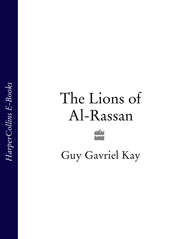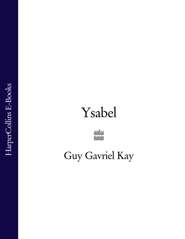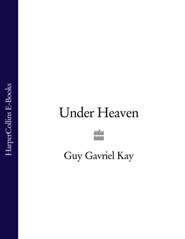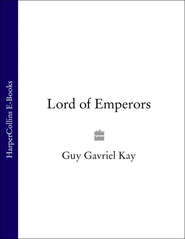По всем вопросам обращайтесь на: info@litportal.ru
(©) 2003-2025.
✖
A Song for Arbonne
Автор
Год написания книги
2019
Настройки чтения
Размер шрифта
Высота строк
Поля
He narrowed his gaze across the dazzling blue water. He could make out a handful of small boats at anchor or pulled up on the sands of the island’s nearer shore. One boat with a single white sail was tacking back and forth across the lake into the breeze. Watching, Blaise’s thoughts went back to the High Priestess with her owl in the blackness of night on Rian’s other island, in the sea. After a moment he looked away in the bright sunshine and rode on.
He passed the small hut that held and kept dry wood and kindling for the signal fires that would summon the priestesses when those on the shore had need, whether for childbirth or healing or surrendering the dead. He resisted the impulse to make a warding sign.
A little further along the path he saw the arch.
He stopped his horse again. The pack pony trudging behind with his goods and his armour bumped up against them and then placidly lowered its head to crop at the grass by the road. Blaise was staring at that arrogant, monumental assertion of stone. The soldier in him understood it at once, and admiration vied with an inward disquiet.
There were figures carved along the top of the arch, and there would be friezes along the sides as well. He didn’t need to go nearer to study them; he knew what the sculptor’s art had rendered there. He had seen such arches before, in northern Portezza, in Götzland, two in Gorhaut itself near the mountain passes, which seemed to be as far north as the Ancients had established themselves.
The massive arch offered its own clear testimony as to what those who built it had been. Where the milestones by the long, straight roads told of continuity and the orderly, regulated flow of society in a world now lost, the triumphal arches such as this one spoke to nothing but domination, the brutal grinding down of whomever had been here when the Ancients came to conquer.
Blaise had been to war many times, both for his country and for his own purse as a mercenary, and had known both triumph and defeat on widely scattered battlefields. Once, by the frost-rimed Iersen Bridge, he had fought among ice and blowing snow past the bitter death of his king through to a twilit winter victory that had then been alchemized into defeat in the elegantly phrased courtiers’ treaty of the spring that followed. That one had changed him, he thought. That one had changed his life forever.
The arch standing here at the end of a procession of planted trees told a hard truth that Blaise knew in his soldier’s bones to be as valid now as it had been centuries ago: when you have beaten someone, when you have conquered and occupied them, you must never let them forget the power that you have and the consequences of resistance.
What happened when the arches remained but those who had so arrogantly raised them were dust and long departed was a question for milk-fed philosophers and troubadours, Blaise thought, not for a fighting man.
He turned his head away, unsettled and unexpectedly angered. And it was only when he did so, wresting his attention from the massive arch, that he became aware, belatedly, that he was no longer alone on this shore of Lake Dierne under a westering sun.
There were six of them, in dark green hose and tunics. The livery meant they were unlikely to be outlaws, which was good. Rather less encouraging was the fact that three of them had bows out and arrows to string already, levelled at him before any words of greeting or challenge had been spoken. What was even more ominous was that the obvious leader, sitting his horse a few feet ahead and to one side of the others, was a rangy, dark-skinned, moustachioed Arimondan. Experience in several countries, and one sword fight he preferred not to remember except for the lesson it had taught him, had led Blaise to be exceptionally wary of the swarthy warriors of that hot, dry land beyond the western mountains. Especially when they appeared at the head of men who were aiming arrows at his chest.
Blaise held out his empty hands and lifted his voice into the wind. ‘I give you greetings, corans. I am a traveller on a high road of Arbonne. I mean no offence to anyone and trust I have given none.’ He was silent, watching, and left his hands out to be seen. He had defeated four men once at a tourney in Aulensburg, but there were six here, with arrows.
The Arimondan twitched his reins and his horse, a genuinely magnificent black, moved forward a few restive paces. ‘Fighting corans carrying armour sometimes give offence merely by their existence,’ the man said. ‘Who is it that you serve?’ He spoke Arbonnais flawlessly, with scarcely a trace of an accent. He was clearly no stranger to this land. He was also observant. Blaise’s armour was well wrapped under cloth on the pack pony; the Arimondan would have deduced what it was by shape.
But Blaise, too, was used to watching men closely, especially in a situation such as this, and out of the corner of his eye he saw one of the archers lean forward with the question, as if hanging upon the answer.
Blaise temporized. He had no real idea what was happening here. Outlaws on the roads were one thing, but these men were clearly trained and just as clearly asserting control over this part of the road. He wished he’d studied a map more closely before leaving Baude. It would have helped to know whose lands these were. He ought to have asked more questions at last night’s inn.
He said, ‘I am travelling in peace on an open road. I mean no trespass. If such is your complaint, I will gladly pay a fair toll.’
‘I asked a question,’ the Arimondan said flatly. ‘Answer it.’
Hearing that tone, Blaise felt his mouth go dry, even as a familiar anger began rising in him. He had his sword, and his bow was ready to hand in the saddle quiver, but if the three men behind the Arimondan knew how to shoot there was little hope in trying to fight. He considered cutting the rope that tied the pony to his grey and making a run for it, but he hated leaving his armour behind almost as much as he hated fleeing from an Arimondan.
‘I am not in the custom of detailing my affairs to strangers with bows drawn,’ he said.
The Arimondan smiled slowly, as if the words were an unexpected gift. He gestured with his left hand, a negligent, graceful movement. All three archers loosed arrows. An instant later, with a queer, grunting sound, Blaise’s pack pony collapsed behind him. Two arrows were in its neck and one was just below, near the heart. The pony was dead. The archers had already notched three more arrows.
Feeling the colour leave his face, Blaise heard the Arimondan laugh. ‘Tell me,’ the man said lazily, ‘will you preserve what you call your customs when you are naked and bound face down in the dust to serve my pleasure like a boy bought for an hour?’ The two other men, the ones without bows, had moved without visible instruction in opposite directions, cutting off both paths of flight for Blaise. One of them, Blaise saw, was smiling broadly.
‘I asked a question,’ the Arimondan went on softly. The wind had dropped; his voice carried in the stillness. ‘The horse dies next if I am not answered. In whose service do you ride, Northerner?’
It was his beard, of course; it labelled him like a brand marked a thief or blue robes a priest of Corannos. Blaise drew a slow breath and, fighting hard to hold down his anger, sought shelter in the shade of the great—as Rudel had more than once put it.
‘En Bertran de Talair has hired me for a season,’ he said.
They shot the horse.
But Blaise had had his clue from the one archer’s straining manner the first time the question had been asked, and he had kicked his legs free of the stirrups even as he spoke. He landed on the far side of the screaming stallion and pulled his bow free and the dying horse downwards towards him in the same motion so that it offered protection when he dropped behind it. Firing from an almost prone position he killed the northernmost coran and, turning, shot the one guarding the southern path in the neck before the three archers could loose another volley. Then he dropped flat.
Two arrows hit his horse again and the third whizzed above his head. Blaise rose to one knee and fired twice, at speed. One archer died, screaming like the horse, and the second dropped in silence with an arrow in his throat. The third man hesitated, his mouth falling open with dismay. Blaise notched his fifth arrow and shot him calmly in the chest. He saw bright blood stain the dark green tunic before the man fell.
It was suddenly extremely quiet.
The Arimondan had not moved. His magnificent black thoroughbred was still as a statue, though with nostrils flared wide.
‘Now you have given offence,’ the dark-skinned man said, his voice still silky and soft. ‘I see that you can shoot from hiding. Come now and we will see if you are a man among men with a sword as well. I will dismount.’
Blaise stood up. ‘If I thought you a man I would do so,’ he said. His voice sounded oddly hollow to his own ears. The too-familiar pounding was in his head and his rage was still with him. ‘I want your horse. I will think of you with pleasure when I ride it.’ And with the words he loosed his sixth arrow and took the Arimondan through the heart.
The man rocked violently backwards with the impact, clinging to his last seconds of life under the brilliant sun. Blaise saw him draw a dagger then, one of the wickedly curved, bejewelled blades of his own country, and plunge it, even as he began to topple from his saddle, deep into the throat of his black stallion.
The man hit the ground as his horse surged high into the air on its hind legs, screaming in rage and fear. It came down and rose again immediately, trumpeting, lashing out with its hooves. Blaise notched a last arrow and let it fly, with passionate regret, to put the glorious creature out of pain. The stallion dropped and then rolled on one side. Its legs kicked out one more time and then were motionless.
Blaise stepped forward, moving around his own dead horse. The stillness in the clearing was eerie, broken only by the nervous whickering of the archers’ mounts and the sound of the breeze picking up again. He realized that no birds were singing now.
A short while ago he had imagined that the wind of Arbonne in the leaves and vines whispered of refreshment and ease, of easy grace here in the warm south. Now there were six dead men in the grass by the side of the road. Not far away, looming in silence at the end of its avenue of elms, the massive arch looked down upon them all, keeping its secrets, bearing its own grim friezes of battle and death carved long ago.
Blaise’s anger began to drain away, leaving behind the disorientation and nausea that seemed always to follow combat. Battle seldom fazed him now after so many years of it, but the aftermath left him vulnerable for a long time, trying to come to terms with what he was capable of doing when the fury of war swept over him. He looked across the grass at the Arimondan and shook his head. He had wanted, for a moment, to walk over and cut the dead man into pieces, to make things easier for the carrion dogs when they came. He swallowed and turned away.
As he did he saw a small boat with a white sail pulling up to the stony shore of the lake on the far side of the road. There was a grating sound as the craft grounded itself, and Blaise saw two men help a woman to alight. His heart thumped once, hard. The woman was tall, robed in crimson fringed with silver, and she had an owl on her shoulder.
Then he looked more closely, and with a second glance, undistorted by memory or fear, he saw that this was not the High Priestess from Rian’s Island in the sea. This one was much younger and brown-haired and, manifestly, she had eyes with which to see. Nor was her bird white, as the one on the other island had been. She was a priestess, though, and the two men with her and the one other woman were also clergy of Rian. The boat was the one he’d seen tacking into the wind before. Beyond them, on the isle, the three plumes of smoke still rose into the summer sky.
‘You are fortunate,’ the woman said, walking steadily across sand and gravel to stand before him on the grass beside the road. Her voice was mild but her eyes, appraising him, were steady and unreadable. Her hair was heavy and hung down her back, not covered or pinned. Blaise endured her scrutiny impassively, remembering the blindness of the High Priestess who had seen right through him nonetheless. He looked at the bird this one carried on her shoulder and felt an echo of the anxiety he’d felt in the forest on the island. It was almost unfair; the aftermath of combat left him susceptible to this.
‘I daresay I am,’ he said, as calmly as he could. ‘I could not have expected to prevail against six. It seems the god has favoured me.’ That last was a challenge of sorts.
She didn’t rise to the bait. ‘And Rian as well. We can bear witness for you that they attacked first.’
‘Bear witness?’
She smiled then, and that smile, too, took him back to the High Priestess in her night forest. ‘It would have served you better, Blaise of Gorhaut, to have been more curious about affairs in this part of the world.’
He didn’t like her tone, and he didn’t know what she was talking about. His uneasiness increased; the women in this country were unimaginably difficult to deal with.
‘How do you know my name?’
Again the secretive, superior smile, but this time he had expected it. ‘Did you imagine that once having been allowed to leave Rian’s Island alive you were free of the goddess? We have marked you, Northerner. Thank us for it.’
‘Why? For following me?’
‘Not following. We have been waiting for you. We knew you were coming. And as to the why … hear now what you should have learned already for yourself. A fortnight past, the countess in Barbentain had an edict proclaimed that any further killings among the corans of Talair or Miraval would result in property of the offending party being ceded to the crown. The troubadours and the clergy are carrying the tidings, and all the lords of Arbonne have been cited by name and formally bound to impose the edict by force if need be. You might have cost En Bertran a part of his land today had we not been here to give a report in your defence.’
Blaise scowled, in part with relief, in part because this was indeed something he should have made a point of knowing before. ‘You will forgive me if I do not express dismay,’ he said. ‘I must admit I would not have valued his vineyards over my life, however much he proposes to pay me in wages.’
The priestess laughed aloud. She was younger than a first impression had suggested. ‘Our forgiveness hardly need concern you … in this, at least. But Bertran de Talair is another matter. He might have fairly expected an experienced coran to avoid giving provocation before even arriving at his castle. There is an eastern way around the lake if you hadn’t noticed, one that does not pass by the vineyards of Miraval.’











